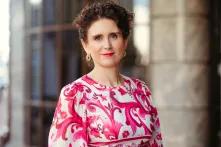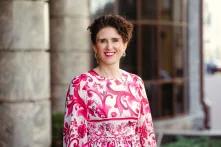The Ukrainian women have proven that they cannot be reduced to the role of victims, but are prepared to take an active position, says Dr Imme Scholz, jury chair and board member of the Heinrich Böll Foundation, in her reasons for awarding the Anne Klein Women's Award 2024.

For more than two years now, there has been a brutal war of aggression raging in Ukraine that will change the country for decades to come. Large areas in the country have been devastated, tens of thousands of civilians and soldiers injured or killed. The material, physical and psychological damage inflicted on Ukraine and its people will continue to shape the country for generations, long after the war has ended. Thus, for us, this award ceremony is also an occasion to remember the victims of this war, and to remind ourselves, too, of the tragic situation unfolding in Ukraine.
Violence and destruction are not the only things bringing about lasting change in Ukraine though. People are also doing so. People, like Yuliya Sporysh, who are working under the motto “Build Back Better” to create a brighter future, one that is based on democracy, human rights and equal rights. People like Yuliya, who have found the courage and the strength to step outside their comfort zones, and act as leaders in the social resistance and the reconstruction of Ukraine. For this, they have earned – you, dear Yuliya – have earned our greatest respect.
We are giving the Anne Klein Women’s Award to Yuliya Sporysh today because of her extraordinary efforts on behalf of the rights of Ukrainian women and girls, efforts through which she has been laying important groundwork for democracy and lasting peace in all of Europe. Yuliya Sporysh established the NGO “Girls” in Kyiv in 2019. The initial aims of the organisation were to promote sexual education and combat violence against women. With the Russian invasion of Ukraine came a multiplicity of new tasks, though: a challenge that Yuliya Sporysh and her colleagues have been meeting with admirable dedication and determination.
The work of Yuliya and her organisation impressed those of us on the jury in numerous respects:
Even in the midst of the war, Yuliya and her fellow activists have continued their efforts to increase women’s visibility and independence and to get more women into leadership roles in Ukrainian society. This is no trivial endeavour, as issues relating to the power and representation of women are often knocked off the agenda when war breaks out, if they were on it in the first place. Yuliya, though, sees the current situation as providing an opportunity: with many men at the front, injured or killed, women can and must demonstrate their leadership qualities.
Contradictory developments are not infrequent in situations of armed conflict: There is often a reversion to traditional roles, with women taking over even more of the work of caring for others. However, there are also opportunities, born of necessity, for women to replace men in traditionally male occupations, including in leadership positions in those fields. Moreover, the war has changed gender relations in Ukraine, disrupting, at least temporarily, the firmly entrenched gender roles in Ukrainian society. Now, the aim must be to lock in these beneficial changes, both for the short term and with a view to the period after the war, and defend the gains made in the representation of women in these areas for the long term.
The energy sector can illustrate this point. Our Kyiv office has been supporting projects aimed at empowering women in the energy sector since 2019 – and the importance of this work has only increased since the start of the war. This is a sector in which women have traditionally been underrepresented, particularly in technical and leadership roles. One might think that the need to fill positions vacated by men due to the war would guarantee the promotion of women, but this is far from always the case. Thus, this approach is the right one: to strengthen women by building networks and training them for managerial positions, and by doing so, also support women in energy-sector occupations who have been forced to flee their homes in Eastern Ukraine.
Yuliya helps women whose partners are off fighting at the front or who have fallen in the war through initial and continuing training that enables women to earn an income of their own and feed their families. Her organisation also directly enables many women to earn a living by hiring them to support internally displaced persons or work in Dnipro in Eastern Ukraine.
In addition, Yuliya attaches great importance to supporting other women’s organisations that are tackling problems caused by the war. Her organisation is also open to LGBTIQ people, and it works with NGOs that represent their interests and needs. Yuliya’s NGO is authorised to provide sexual education in schools and uses that forum to work against the exclusion and stigmatization of LGBTIQ.
The Russian war against Ukraine has clearly had gender-specific impacts. While the dangers associated with military service affect men in larger numbers (women make up 22% of Ukrainian army personnel), women are at increased risk of sexual and domestic violence and forced displacement from or within Ukraine. Russia has used sexual violence as part of its military strategy on multiple occasions since 2014, as, for instance, the reports of soldiers equipped with Viagra suggest. Moreover, women make up 60% of the five million internally displaced persons in Ukraine, and, according to various sources, 70% or even 80% of the six million people who fled the war to seek refuge in the EU.
Yuliya and her organisation also campaign for the legal prosecution of sexualised violence as a weapon of war; and it was in this context that she met Joumana Seif, our 2023 award winner.
Ukrainian women have proven that they will not allow their roles to be reduced to that of victims and that they are, in fact, willing and able to take up active positions and act as genuine agents of change. Women are at the forefront of the volunteer movement, they are saving lives in operating theatres and evacuating children from the front, they are serving as the face of Ukrainian diplomacy, they are fighting for international support and as soldiers at the front – and they will play an essential role for the future of Ukraine: as engineers, lawyers, scientists, journalists, entrepreneurs and politicians. For all of this, they deserve recognition and, above all, equal participation in the political, economic and social life of their society.
To ensure a stable and secure future, women must be involved in the decision-making on the reconstruction of Ukraine on an equal basis with men. This is another area in which Yuliya Sporysh, with vision and foresight, is taking action.
This past December, our Kyiv office held a conference on the role of women in the country’s reconstruction and new development. Yuliya was among those invited. The conference made it quite clear that Ukrainian women play an important role in the resistance and for the resilience of Ukraine. It is therefore imperative to ensure that women both profit from the reconstruction and contribute to shaping it. To this end, women should be represented in at least 50% of decision-making roles at all levels. This will allow them to bring their perspectives to bear, perspectives which are informed not only by their expertise in their fields, but also by their gender-specific roles and experiences and by their experiences in new areas of responsibility in the war.
The 2024 Ukraine Recovery Conference, which is to be jointly hosted by Ukraine and Germany here in Berlin this June, will provide an opportunity for this. A gender-sensitive and gender-responsive reconstruction is of fundamental importance for the country. Over 40 million square metres of housing space have been destroyed: these must be redeveloped in a manner suited to the needs of the war-wounded and of women and the children and other family members for whom they are responsible. Rapid reconstruction of the social infrastructure – daycare centres, schools, hospitals and care homes for older people – will also be necessary, as this is essential in order to free women from the burden of unpaid care work and prevent a reversion to traditional gender roles.
To quote Oleksandra Matviichuk, the head of the Center for Civil Liberties and a 2022 Nobel Peace Prize laureate:
“Women are at the forefront of this war. Courage has no gender. In the “Russian world”, men are dominant, women play only certain defined roles. This is where authoritarian Russia is different from Europe. Our daughters must never find themselves in a situation where they have to prove to someone that they are also human beings.”
We know that peace and security are more sustainable when decision-making processes concerning security policy are inclusive by design. This is why the Heinrich Böll Foundation actively promotes the participation of women in peace processes, in Ukraine and elsewhere. In wars and conflicts all around the world, large numbers of women, girls and LGBTIQ people become the victims of sexual violence and forced displacement even as they take over responsibility – for their families and their societies. Nonetheless, they have little say in decision-making. Women belong at the negotiating table when ways to resolve conflicts are being sought: better use must be made of their transformative potential in order to achieve lasting peace.
In 1990, 350 women from 38 countries gathered in Berlin for the first Women’s Conference on Security and Cooperation in Europe to discuss the role of women in the European peace process. In her opening address, Anne Klein, whose name is borne by the award we are granting today and who would have celebrated her 74th birthday tomorrow, said this:
“We continue to be united by the desire to bring female perspectives to bear on policy, finally, and to arrive at a reappraisal and reallocation of the social tasks of women and men, both in the area of production and in the area of reproduction. Thus far, only men have been involved in building what they are calling a “common house”. Women are not on the construction management team. They suspect, and rightly so, that the plans place them in the kitchen and the broom closet.”
The world has changed, thanks to pioneers like Anne Klein: women have been exercising their right to work on the construction of our common house of Europe for quite some time – yet the desire for participation and representation still unites us 34 years later. And I am certain that Anne Klein would have been proud to know that we are bestowing an award that bears her name to honour an engineer of peace in Europe today. My dear Yuliya, thank you very much for all your work and congratulations on receiving the Anne Klein Women’s Award!
Now I’m going to pass the floor to Jamila Schäfer for the presentation address: Jamila please come onto the stage.
Translated from Alison Borrowman.

